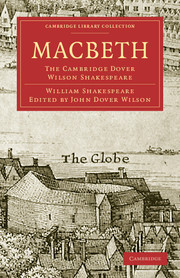INTRODUCTION
Published online by Cambridge University Press: 07 September 2010
Summary
This is a difficult play to edit. Few of Shakespeare's have been more discussed; yet, though the greatest critics have given their mind to it, they have not always done so wisely or with cogency. In few again is the textual basis so obscure or the necessity for a definition of it so compelling. With many plays one can pass direct to the dramatic problems without troubling about the history of the text, but not with Macbeth; while the wildest and most divergent textual theories are current, are indeed endorsed by eminent writers. Readers of this Introduction are, therefore, asked to accept its long second section as a necessary evil, if they do not decide to skip it as they well may. On the other hand, I find my path eased by excellent and scholarly modern editions, among which special acknowledgements are due to that of Sir Edmund Chambers (1893), that of Sir Herbert Grierson and Dr J. C. Smith (1914), and that of Professor Kittredge (1939). Further, the problem of contemporary staging, so important in Macbeth, which relies upon supernatural machinery more than any other play of Shakespeare's, and the kindred problem of contemporary demonology, have recently been much illuminated by The Globe Playhouse of Professor J. C. Adams (1943) and Shakespeare's Philosophical Patterns of Professor W. C. Curry (1937); books that reached me from across the ocean in a happy hour.
- Type
- Chapter
- Information
- MacbethThe Cambridge Dover Wilson Shakespeare, pp. vii - lxviiiPublisher: Cambridge University PressPrint publication year: 2009First published in: 1947



